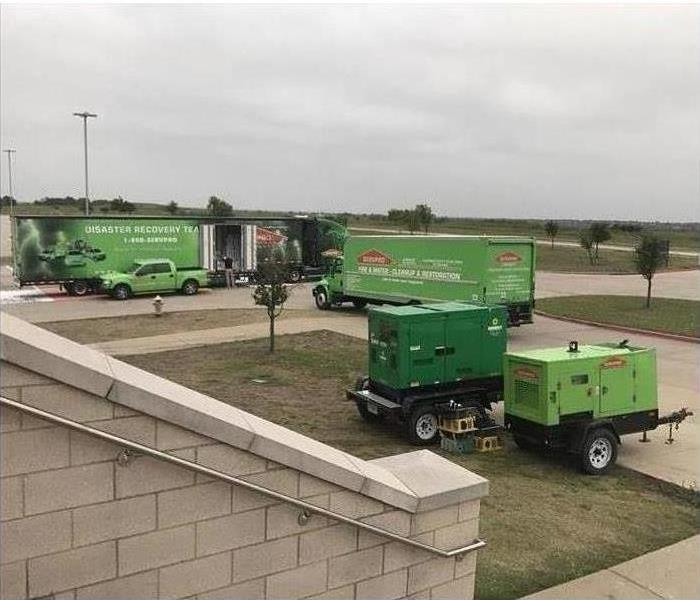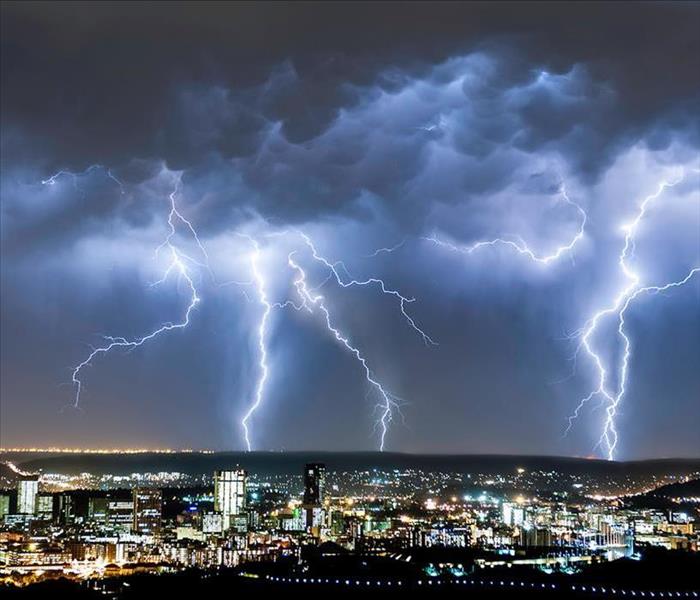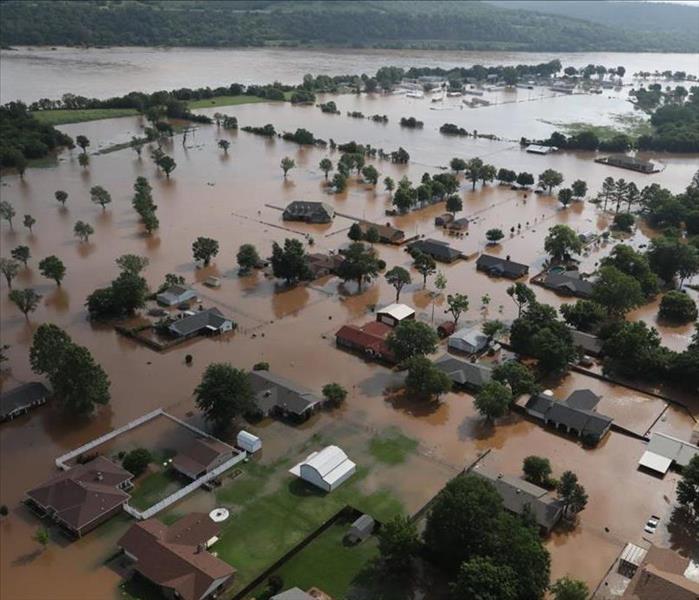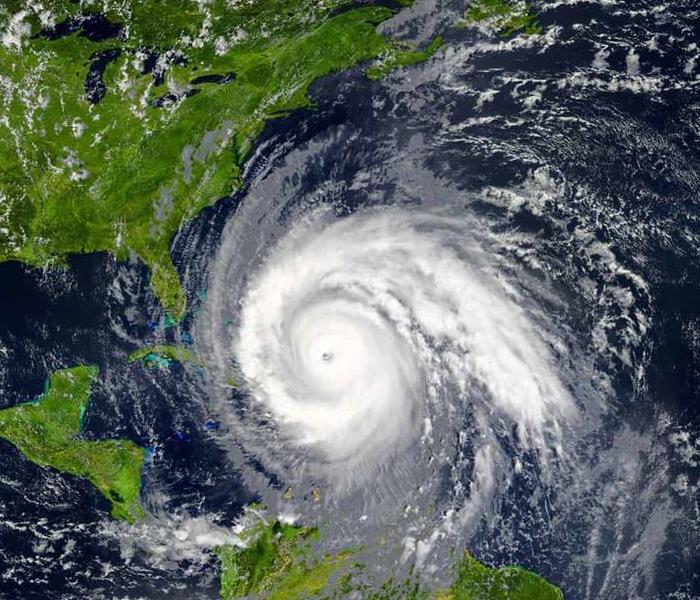Recent Storm Damage Posts
Hurricane Season is Back!
8/29/2023 (Permalink)
 Hurricanes are powerful storms, and should not be taken lightly.
Hurricanes are powerful storms, and should not be taken lightly.
While hurricane season for 2023 started back in June, it took until relatively recently to start seeing major news regarding upcoming storm events. Hurricane season is a period of time every year, typically from June through November, where the temperature and ocean conditions are just right to form tropical depressions, which commonly lead to tropical storms and occasionally hurricanes. The way a hurricane forms is similar in many ways to the formation of tornadoes in the North American Midwest, so their power and destructive capability should NOT be underestimated. Several years ago in 2017, Hurricane Harvey tore through the Texas and Louisiana coastline, quickly becoming one of the costliest storms in U.S. history.
At the time of this writing, the 2023 hurricane season is seeing storm systems in the form of Hurricanes Franklin and Idalia, and more could be on the way in the near future. The best way to keep yourself up to date on potential storm events is to check your local news and weather channels. Modern day technology has the capability to predict these storms days in advance, sometimes even up to a week or two. For more information, check out the National Hurricane Center. Their website displays a weather tracker for the Atlantic, and includes a library of public information to help you keep informed about storm terminology, as well as archives on past hurricane seasons. When it comes to your safety, knowledge is one of the greatest tools!
Preparing For a Winter Storm
12/22/2022 (Permalink)
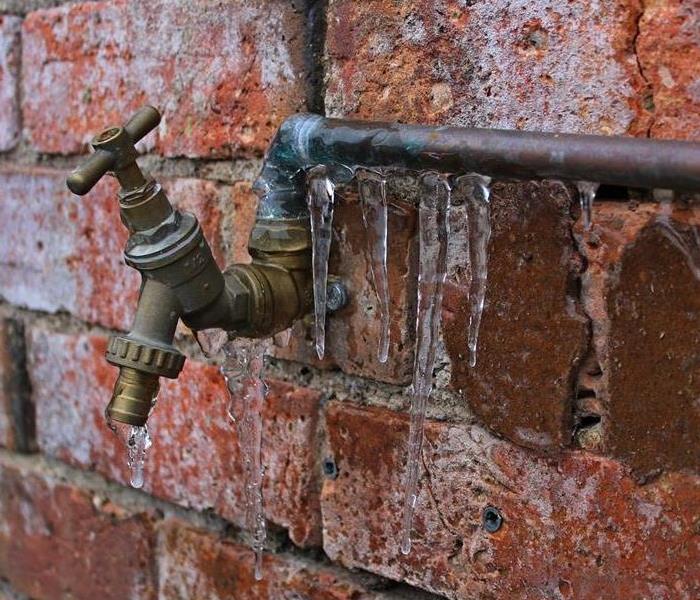 Keeping winter storm safety tips in mind can make all the difference in safety for you and your home/business.
Keeping winter storm safety tips in mind can make all the difference in safety for you and your home/business.
Winter storm Elliot is on the way to Texas, and he's bringing below-freezing temperatures with him. With storms like this, precautions have to be made in order to prevent damage to the home or business. While we've had ample time to prepare, it's always good to keep certain safety tips in mind if some last minute planning needs to be done.
Winter Storm Safety Tips
- Cover up exposed spigots and pipes with insulation. Many stores sell styrofoam covers for spigots and pipe sleeves for pipes.
- Keep the heater running in your home or business, even when you're away. Even if the heating bill is higher than normal, it's preferable to a costly repair service for burst pipes.
- Allow water to drip from your faucets. This goes a long way in helping to prevent frozen pipes by allowing flowing water to come through.
- Bring all pets indoors. They're family too, and they shouldn't be left out in the cold.
- Locate your water supply main. Once things start warming up, knowing the location of your water main will help greatly in the event of water damage.
For more information, please consult the Red Cross Winter Preparedness page for more winter storm safety tips. And in the event of damage to the home or business due to water, don't hesitate to call us here at SERVPRO of Kaufman County, Mesquite. We're always available to help wherever needed and strive to make your troubles "Like it never even happened®".
Heat Wave Safety
8/16/2022 (Permalink)
 No cloud cover and excessive heat? Make sure to keep shaded and hydrated!
No cloud cover and excessive heat? Make sure to keep shaded and hydrated!
North Texas is still in the midst of a brutal heat wave. While relief is coming soon in the form of much-needed rain and cloud cover, the days leading up to it will be incredibly hot and humid. A heat wave can best be defined as a period of excessively hot weather, sometimes accompanied by humidity. Heat waves can be dangerous as they can heat up metal outdoors to burning temperatures, cause prolonged periods of drought, and even heat exhaustion in people. Here are some handy tips and precautions to keep in mind during a heat wave:
- Staying hydrated is key. Make sure to drink plenty of water, and avoid sugary or caffeinated drinks/foods, as they can cause you to become more thirsty/hungry.
- Make sure to have adequate supplies of food, water, and medicine in case of emergencies.
- Keeping your home cool can help provide relief during a heat wave. Drapes to cover the windows, weather strips on doors and windows, and insulation against the heat can help make your home a refreshingly cool safe haven.
- NEVER leave children or pets in a vehicle unattended. Temperatures inside vehicles can trend 10 or 20 degrees higher than the outdoor temperature.
- Stay healthy. Heat waves are a type of disaster and can prove to be mentally draining, so eating healthy foods and staying hydrated can help create some peace of mind.
For more information on how to beat the heat and staying safe during a heat wave, Red Cross has a page on heat waves and treating heat-related illnesses. Knowledge is a vital tool in keeping safe. Also, in the event of heat-related damage to your home such as a fire, keeping the AC running with a duct cleaning, or mitigating water damage from broken water pipes, SERVPRO of Kaufman County / Mesquite is always ready to help make it "Like It Never Even Happened".
Sudden Summer Storms
7/14/2022 (Permalink)
 Sometimes storms can occur in Summer without prior warning. Knowing certain safety tips can help protect you and your home or business!
Sometimes storms can occur in Summer without prior warning. Knowing certain safety tips can help protect you and your home or business!
Summer 2020 was one of the costliest seasons on record for storm damage. While no large coastal storms or thunderstorms have occurred yet, it's always nice to have certain information handy in the event of a sudden storm. By following a few simple preparedness tips, you can protect your home and business from becoming a statistic.
Ahead of a Storm
- Make a disaster-preparation strategy. Create an exterior meeting spot as well as escape routes from each room in your home. Practice the plan with family members as well. Include your pets in the plan and make sure they are wearing identification tags.
- Make sure you and your family know how to use a fire extinguisher and how to turn off utilities.
- Be sure your policy includes flood insurance. This may be an additional item, as it isn't covered by most ordinary insurance policies.
- Prepare your emergency supply kit, including the following:
- 3–5 days’ worth of non-perishable food and bottled water
- Scissors, tweezers, cloth tape, antibiotic ointment, adhesive bandages, non-latex gloves, and other items for a first-aid kit.
- External batteries for cell phones, etc., as well as a battery-powered flashlight and radio with backup batteries or solar chargers.
- If necessary, prescription drugs.
- Blankets and warm clothing are essential.
- Items for personal hygiene (toilet paper, tissue, deodorant, toothbrushes, and toothpaste)
During a Storm
- When a storm is approaching, bring all of your valuables inside and relocate all of your vehicles and equipment to higher ground.
- Walking through moving water is not a good idea. You can be swept off your feet by just a few inches of quickly moving water.
- If you're outside, move to higher ground and stay away from low-lying places that may be vulnerable to flooding.
- Make sure the doors and windows are securely shut if you're inside. Avoid being struck by shattered glass by staying away from windows. If the storm is severe, seek cover in your basement.
- Use of utilities and wired electrical equipment should be avoided. Turn off utilities to reduce the risk of damage from flooding or other disasters.
- Keep up with weather reports and follow local officials' instructions if they urge you to leave your home.
After a Storm
- Check to see whether everyone is okay and if your home has been damaged. Keep an eye out for potential dangers.
- If you suspect that utilities have been damaged, contact your local authorities and wait for their clearance before turning them back on.
- If your home has been flooded, stay away from the floodwater because it is likely contaminated.
- Make a note of the goods that have been damaged or lost, and take photos of them.
- Make a claim on your flood insurance.
- Floodwater is deemed polluted in its entirety. As a result, if you have water damage, all contaminated absorbent materials should be removed and thrown away (carpets, rugs, upholstered furniture, etc.).
- Water damage needs to be repaired as soon as possible. Otherwise, mold contamination will occur, causing a slew of additional concerns and issues.
If you are affected by a summer storm, the experts at SERVPRO Kaufman County, Mesquite are ready to help. Our trained mitigation team is ready to respond quickly and efficiently to minimize the damage and restore your home or business "Like it never even happened."
Hurricane Evacuation How-To
6/20/2022 (Permalink)
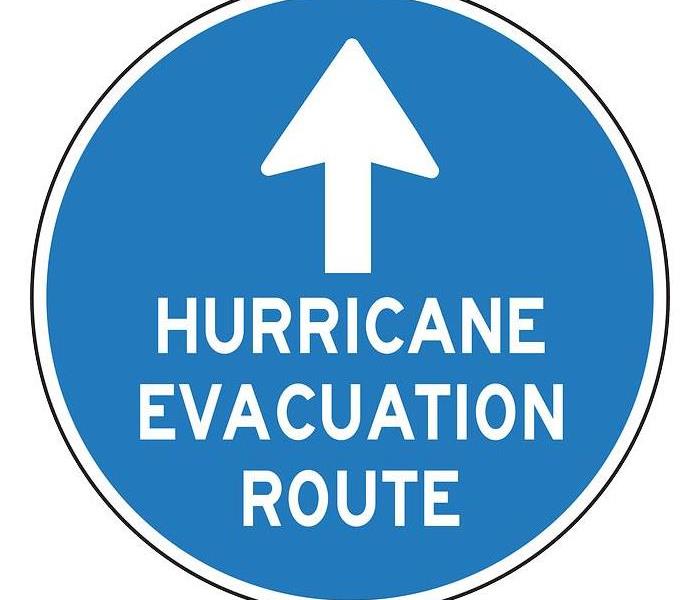 Signs like these around coastal cities are an indicator of where to go to evacuate in case of a hurricane.
Signs like these around coastal cities are an indicator of where to go to evacuate in case of a hurricane.
Nature can be somewhat unpredictable. With the advent and improvement of forecast technology however, we have the ability to predict certain weather events in advance before they happen. Storm tracking, especially with tropical storms and hurricanes, is much better now than it was decades ago. Because of this, there's more time to consider options before a storm strikes. When it comes to hurricanes, there are a few options that can be considered for your safety:
- Staying indoors and waiting out a storm, preferably in a fortified part of the house such as a closet or bathroom.
- Going to the nearest storm shelter; many will be built in a way to provide additional safety that an average home couldn't.
- Evacuating inland to a safer area to avoid the storm. Evacuation routes are specifically built for this purpose.
Evacuation routes for tropical storms and hurricanes are typically marked with specific road signs. These tend to be more common around towns or cities close to the Gulf or Atlantic shoreline, and are there for your convenience. They assist in helping you figure out which routes to take to get you away from the storm in the event you feel the need to evacuate. In the event of a storm, whether you evacuate or not, it's always good to keep a storm kit on hand. Above all, your safety is what's most important.
Hurricane Season Is Here!
6/13/2022 (Permalink)
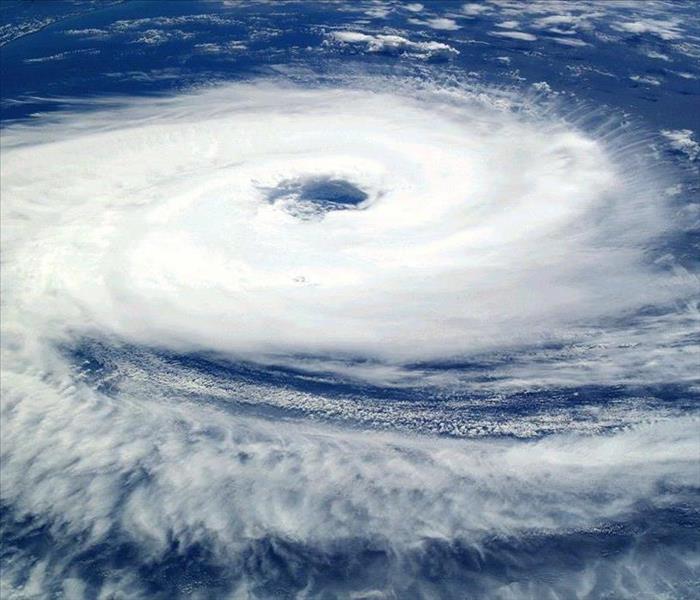 Make sure to keep updated on your local weather for news of tropical storms and hurricanes!
Make sure to keep updated on your local weather for news of tropical storms and hurricanes!
When we entered June, we entered the 2022 Atlantic hurricane season. Hurricane season is a period of time every year, typically from June through November, where the temperature and ocean conditions are just right to form tropical depressions, which commonly lead to tropical storms and occasionally hurricanes. The way a hurricane forms is similar in many ways to the formation of tornadoes in the North American Midwest, so their power and destructive capability should NOT be underestimated. Just a few years ago in 2017, Hurricane Harvey tore through the Texas and Louisiana coastline, quickly becoming one of the costliest storms in U.S. history.
At the time of this writing, the 2022 hurricane season has already seen a tropical storm (Alex), but more could be on the way in the near future. The best way to keep yourself up to date on potential storm events is to check your local news and weather channels. Modern day technology has the capability to predict these storms days in advance, sometimes even up to a week or two. For more information, check out the National Hurricane Center. Their website displays a weather tracker for the Atlantic, and includes a library of public information to help you keep informed about storm terminology, as well as archives on past hurricane seasons. When it comes to your safety, knowledge is one of the greatest tools!
Getting Your Roof Repaired
6/2/2022 (Permalink)
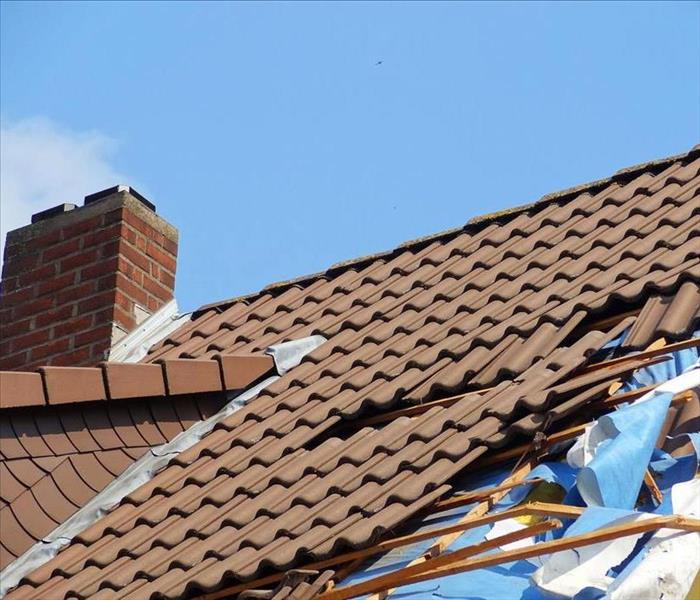 Storms can cause lots of damage, even with the right precautions.
Storms can cause lots of damage, even with the right precautions.
As we head into June, storm season is beginning to pick up. With storms, there's always the chance that you could see damage to your home or place of business, no matter what kind of precautions are taken. Sometimes, this manifests itself in the form of roofing damage, usually caused by when a tree or similarly heavy object punches a hole through the roof of a building. With roof damage, this can let in all sorts of things, such as water from current or future storms, humidity, heat, and even small critters you otherwise don't want in your home.
WHAT CAN BE DONE ABOUT THIS?
SERVPRO of Kaufman County, Mesquite has you covered. We not only help with mitigation and restoration for fire and water damages, but we also cover storm damage as well. Some of our storm services include, but are not limited to:
- Roofing Services
- Roof Tarp Placement
- Tree Removal
- Portable Power
- Temporary Fencing
- And more!
For more information about our storm services, please refer to this link for more information and call our office number at (972) 329-4747. We'll be ready to help out wherever we can!
Storm Preparedness
3/3/2022 (Permalink)
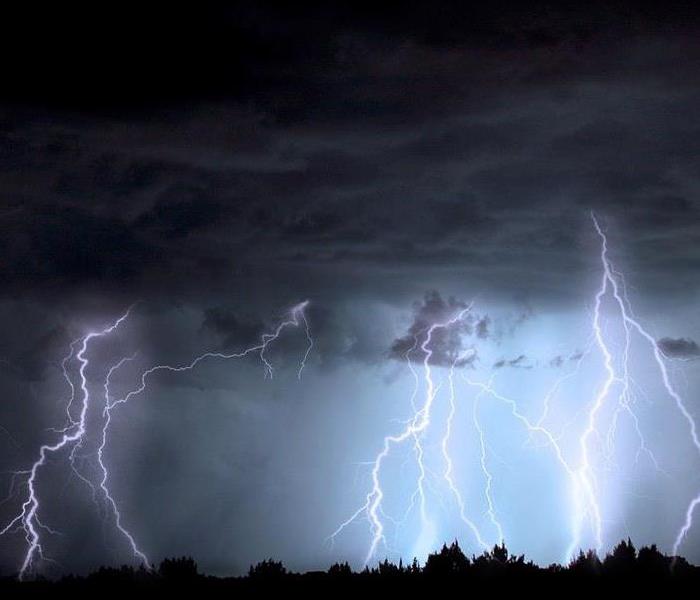 Storms can be unpredictable, so having a plan in place can always help!
Storms can be unpredictable, so having a plan in place can always help!
When a storm is headed your way, what can you do to help protect yourself, your business and your home from severe weather? Knowing the difference between a storm watch and a storm warning will help you know when to seek shelter. By taking a few simple precautions as storm season approaches, you can help minimize the potential for storm-related property damage; however if your home or business does sustain damage, it is important to know where to turn for prompt, professional help.
Although violent storms can strike at anytime, the spring and summer months typically mark an increase in the threat of sudden, severe storms that sometimes include wind, rain, lightning and even hail.
Authorities issue a storm 'watch' when the potential for severe weather exists. A storm 'warning' will be issued when danger from a severe storm in imminent. The following tips will help prepare you to better protect yourself and your property when a storm is on the horizon.
- Put a communication plan in place and prepare an emergency supply kit, including a battery-powered NOAA Weather radio.
- Postpone outdoor activities; secure outdoor objects that could become airborne.
- Don't use corded phones or any appliances that are "plugged in". Use cell or cordless phone instead.
- Seek shelter in a home, building or hard top automobile. The steel frame of a vehicle- not the rubber tires - can help protect you from a lightning strike if you avoid touching metal or other conductive surfaces.
- Avoid windows and doors, don't lie on concrete floors or lean on concrete walls, and stay off of porches.
- If you are outside when a storm hits, seek shelter in a sturdy building. Avoid small, isolated structures in open areas steer clear of hilltops, open fields, the beach or a boat on the water.
After The Storm
- Avoid storm-damaged areas. Stay away from downed power lines and never try to drive through a flooded roadway.
- Replenish your emergency supplies and repair property damage promptly, before the next storm strikes.
SERVPRO of Kaufman County / Mesquite can help you establish an Emergency Ready Profile to expedite help and recovery in an emergency situation. Available 24 hours a day, seven days a week, our quick response time helps limit secondary damage. If your property sustains damage from wind, water or fire, call SERVPRO of Kaufman County / Mesquite to help make it "Like it never even happened." (972) 329-4747
How to Avoid Storm Damage
8/18/2021 (Permalink)
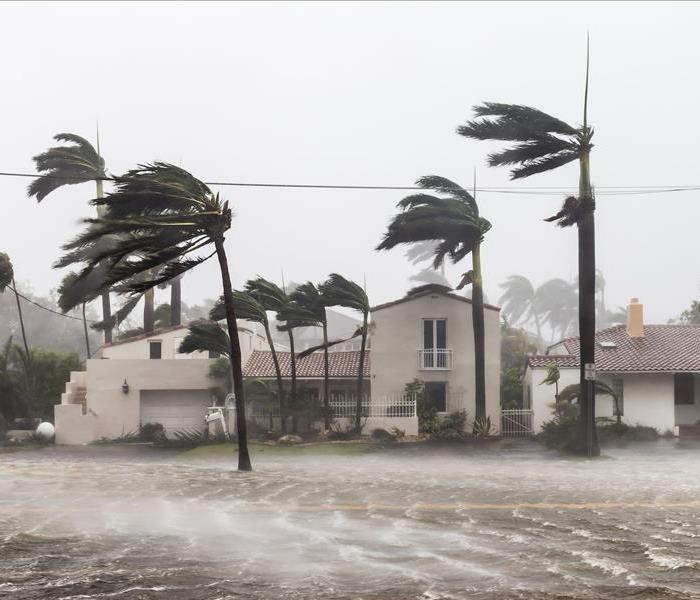 This wind is no joke - and the size of the insurance claim won't be, either.
This wind is no joke - and the size of the insurance claim won't be, either.
Year-to-year, the seriousness and recurrence of storms is anyone's guess, and it's unavoidable that home owners have to bear the brunt of the damage when storms roll through. It's costly, sometimes it's devastating, and when the damage is so severe that your family might not be able to deal with it, we're only a phone call away.
But in those other instances -- when the damage is limited to a broken gutter, a missing shingle, or a small downed limb -- we advise home owners to take precaution while making repairs. In an effort to make sure it doesn't happen to you, SERVPRO of Kaufman County & Cedar Creek has compiled this list, to help you avoid storm damage to your home, business or property.
The most common property damage we see is rooftop and siding damage following strong winds and hail. In lieu of that:
BASIC UPKEEP GOES A LONG WAY
1. REPLACE MISSING OR BROKEN SHINGLES
On the off chance that a shingle is damaged, it's bound to break free. Assuming it's missing, you now have a hole for wind to get under and do considerably more harm.
Note that when you're introducing or supplanting shingles, they should be nailed appropriately — NOT over the nail line.
As far as how roofing materials – shingles versus metal – hold up to hail, it doesn't actually matter. After a hailstorm, we've observed that shingle rooftops hold up as well as metal ones.
2. KEEP YOUR GUTTERS CLEAR
Ensure your gutters are clean so that water is free-flowing and moves away from the home, preventing pooling and bursting.
3. FIX LOOSE SIDING
Similar standards as material apply to siding: guarantee your siding isn't harmed.
4. GUARANTEE PROPER SEALING OF DOORS AND WINDOWS
In case of tornadic winds, a little opening in your windows or entryways could broaden (read: break) and permit enough of a breeze inside, wreaking havoc and spreading water.
5. CHECK FOR LOOSE FENCE POSTS
Wind will astound you. Fence posts are frequently neglected or overlooked in home owners' storm prep, and when one is uprooted, it can take fencing material with it.
6. TRIM YOUR TREES
Downed limbs pose a big problem to home owners. They can fall on roofs, on fencing, on garages and vehicles, resulting in costly damage.
MOST IMPORTANTLY
Remember to secure individuals.
Your home and the things inside are replaceable. Your family isn't.
Have a storm wellbeing plan set up, including a protected area to go, similar to a cellar or tornado cellar, to brave the most noticeably terrible.
Always, storm season brings a great deal of vulnerability, but that doesn't mean there's no way around it.
STORM Team, Come Home.
7/15/2021 (Permalink)
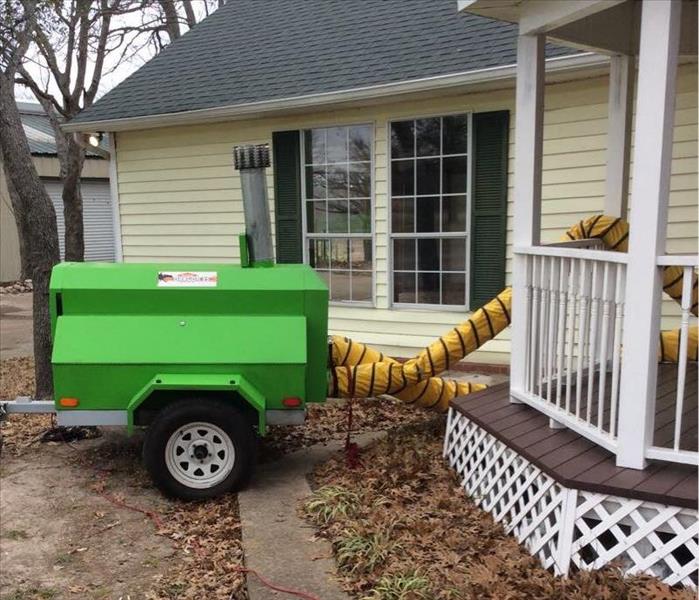 The dry out process utilizes special equipment, seen here.
The dry out process utilizes special equipment, seen here.
The SERVPRO Kaufman County & Cedar Creek STORM team is at last headed back to Texas, after a rigorous two weeks spent in Illinois helping our distant neighbors recover from extreme amounts of rain and flood water. We’re happy to help wherever we’re needed (helping people out is kind of what we do) but there’s just something about Texas that kept the SERVPRO Kaufman County & Cedar Creek team homesick, even after a long days’ worth of fulfilling work, and plenty of happy customers to keep the spirits high.
After much consideration, the team decided the simple matter of it was this:
We love our community. Kaufman County & Cedar Creek isn’t just the place where we all hang our collective hat. The people are irreplaceable, and the hospitality isn’t something you find just anywhere. Not to mention, we don’t usually have to worry about sump pump backups in our fully furnished basements (looking at you, Illinois.)
In short, this piece is an ode to home. We’re back, Kaufman County, and we’re glad to be home.
This also serves as a good time to remind our neighbors and community members that storms can move in quickly and wreak a lot of havoc, causing a shocking amount of damage. Even a standard thunderstorm can dump an extraordinary amount of rain, causing backups, power outages, flash floods and leaks (which, left unchecked, could become mold).
If you find yourself in in such a circumstance, no matter the time or the day, make sure you give SERVPRO of Kaufman County & Cedar Creek a call. We’re here for you, and we can get there faster than the competition, every time.
STORM Team - Activate!
7/8/2021 (Permalink)
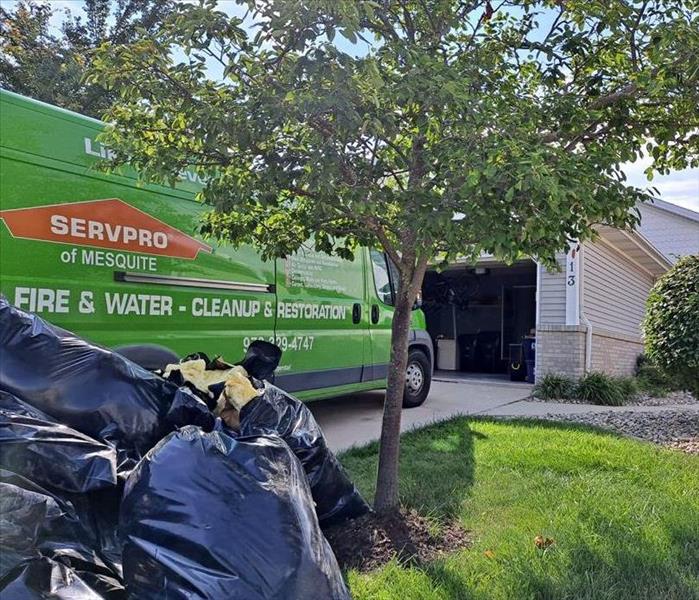 We're not in Kansas anymore, team.
We're not in Kansas anymore, team.
If you’ve been following the weather -- and we get it, not everyone is into national weather forecasts -- you’d know that the Bloomington-Normal Illinois area got uncharacteristically drenched in rain on Friday, June 25th, 2021. Severe storms dropped as much as 6.5 inches of rain in some parts of the county, causing vehicles to stand where they were waterlogged, sump pumps to fail, and electricity to become unreliable at best.
Rain water from the street poured in through basement windows, leaving thousands of people with more water on their hands than they knew what to do with. And if our readers have paid attention to any of the blogs before this one, they know that unchecked water -- whether it’s a little, or a lot-- can wreak havoc on a home, creating immediate and long lasting damage, and cost homeowners thousands.
That’s where SERVPRO Kaufman County & Cedar Creek comes in.
The wonderful thing about SERVPRO is that we’re not only here to help our local neighbors, but in instances like this one, where there’s too much water damage for a single SERVPRO location to handle, no matter where it is, we suit up to help get the job done.
Our teams have been toiling away in Illinois, working long hours to help neighbors we don’t see all too often, and help get them back to, "Like it never even happened."
Staying Safe During Storms
6/29/2021 (Permalink)
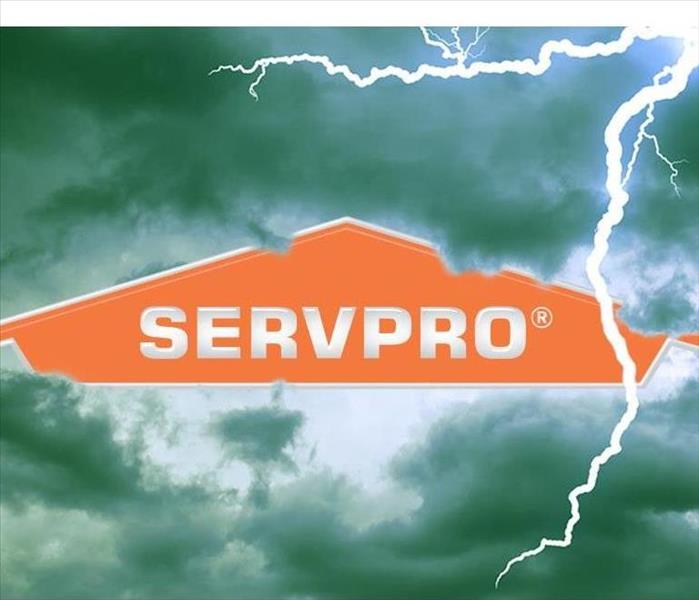 Storms don't scare us. We scare them, with our crazy-fast emergency response times.
Storms don't scare us. We scare them, with our crazy-fast emergency response times.
As mitigation experts, storms mean property damage: Heavy rains lead to flooding, which can damage your HVAC system, walls, floors, and corrode your valuables; High winds can damage your homes and expose them to the elements; Lightning can strike exposed roofs and start fires.
But lightning doesn't only pose a threat to your home and valuables.
Between 2006 and 2018, 33 persons died on average each year in the United States as a result of lightning strikes, according to the National Weather Service. In addition, over 75% of those killed by lightning strikes were doing anything outside during a rainstorm, such as working, hiking, camping, or enjoying watersports.
As a result, when a thunderstorm strikes, it's critical to seek cover as soon as possible and exercise caution. However, because shelter may not be instantly available to everyone stuck outside, we've put together some lightning safety recommendations. Stay safe indoors and out during a thunderstorm by following these lightning safety precautions.
Outdoor Safety tips
Follow these lightning safety tips if you're outside and can't find a safe, enclosed shelter:
- Motorcycles, scooters, golf carts, and bicycles should all be avoided.
- Stay away from power lines, wire fences, metal pipes, railways, and other metallic routes that can conduct electricity.
- Stay away from open fields and elevation regions such as mountain ridges or hills. Also, don't take cover under cliffs or rocky overhangs. Go to a low-lying area like a ravine or a valley but keep an eye out for flash floods.
- If you're in the backcountry or in the woods, get off the mountain as soon as safely possible. Go to the other side of the mountain, away from where the clouds are forming.
- If you're in the woods, find a low spot under a dense canopy of little trees. However, never seek refuge behind a single tree because they serve as natural lightning rods.
- Staying in a tent is not a good idea. Because most modern tents feature carbon fiber or metal poles, they can act as a grounding channel for a cloud-to-ground lightning strike. Also, stay away from porches.
- Water is an electrical conductor, so stay away from it and damp goods. Remove yourself from bodies of water such as pools, ponds, and lakes.
- Before leaving your shelter, wait at least 30 minutes after the last thunderclap.
- If someone is struck by lightning, dial 911 and seek medical attention immediately. Victims may exhibit a variety of symptoms, so be ready to seek assistance, provide CPR, or medical treatment.
Indoor safety Tips
- Keep your distance from windows and doors, as well as porches.
- Anything that consumes electricity, such as TVs, laptops, and cords, should be avoided. Use mobile or cordless phones instead of corded phones.
- Don't use your home's plumbing - don't use the bathroom or kitchen sinks, and don't take a shower.
- During thunderstorms, bring your dog and other animals inside. Lightning strikes are dangerous to dogs tethered to trees.
- To avoid being struck by lightning, don't plug or disconnect electrical equipment during a thunderstorm.
Lightening poses a serious threat to personal safety, as well as the safety of your home or business. Get ahead by preparing yourself and your property with storm-preparation suggestions. If your home or business has been damaged by a storm, don't hesitate to call SERVPRO Kaufman County & Cedar Creek, the damage mitigation experts. We can assist you to mitigate storm and flood damage and rapidly restore your property "Like it never even happened."
Storms and Their Unlikely Side Effects.
6/29/2021 (Permalink)
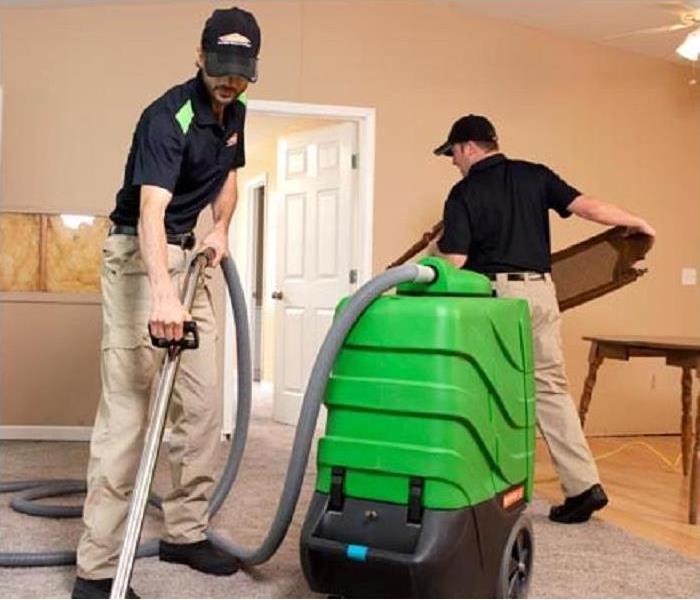 We wish raising kids was as easy as drying after a water loss!
We wish raising kids was as easy as drying after a water loss!
Storm damage is no joke, and poses a serious concern for adults who have an understandable interest in their property and valuables. For that, SERVPRO Kaufman County & Cedar Creek is here to make sure-- if you do sustain damage after a storm-- that we get your life back on track as soon as possible.
However, we pride ourselves on being a pillar in our communities, and as much help as we can offer to the members of our community in the way of water and fire losses as a result of storms, we realize sometimes we can't help where it really counts: Like, when your kids find themselves afraid of thunderstorms. Yikes!
Children frequently suffer from unfounded fears and concerns, such as a dread of thunder and lightning. While you may have your own methods for calming your child in stressful times, there may be other ways to assist youngsters to overcome their fear of thunderstorms. Here are a few examples:
- Recognize your child's fear. Instead of criticizing or telling your youngster not to be afraid, tell them that you understand how they feel. Allow your youngster to express his or her emotions while assuring them that the storm will pass quickly. You might also remark that they shouldn't be afraid as long as they're in their home, automobile, or other secure location.
- Participate in enjoyable activities. Make it a practice to divert your child's focus to pleasurable activities whenever a storm is approaching. Listening to soothing music, watching their favorite movie, or playing games are all fun ways for kids to forget about the noise.
- Make a snack for your child. Similarly to how sight or sound can help us forget about something, savoring our favorite cuisine can help us forget about a horrible experience.
- Explain the nature of thunderstorms. Learn everything you can about thunder and lightning and pass that knowledge on to your child in an understandable manner. This way, they'll understand that thunder and lightning are natural occurrences that pose no threat, unless you're a very unlucky individual who happens to be outside during a thunderstorm.
- Teach kids how to stay safe during thunderstorms. Knowing how to keep safe in the event of a storm can help children relax and gain confidence. Staying indoors and avoiding trees and bodies of water are two basic things they should be aware of.
- Patience is required. Almost every youngster, as they grow older, will overcome their concerns. While you shouldn't expect your child to overcome their fear in a matter of days, you can help them by being sympathetic and comforting them whenever they are afraid. Fear and anxiety will eventually fade away with time.
The experts at SERVPRO Kaufman County & Cedar Creek hope we can help reduce your fear of storms. We hope you never experience the heartbreaking property damage that assaults many Americans every year during storm season. In the event that you do, we’re here to help, quickly, efficiently and with one goal in mind – to restore your property "Like it never even happened."
Summer Storm Preparation Tips
6/29/2021 (Permalink)
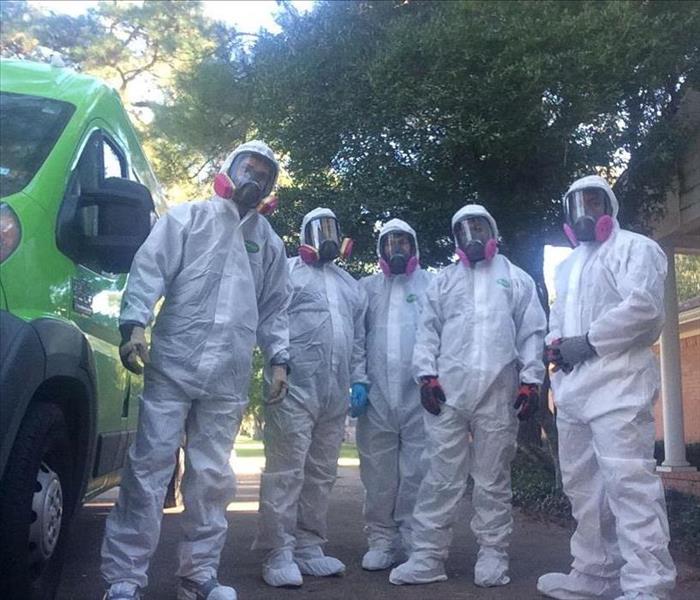 SERVPRO comes ready to tackle any job (pictured here.) Just as ready as you'll be for summer storms after you read this blog post!
SERVPRO comes ready to tackle any job (pictured here.) Just as ready as you'll be for summer storms after you read this blog post!
Summer 2020 was one of the costliest seasons on record for storm damage. By following a few simple preparedness tips, you can protect your home and business from becoming a statistic.
Ahead of a Storm
- Make a disaster-preparation strategy. Create an exterior meeting spot as well as escape routes from each room in your home. Practice the plan with family members as well. Include your pets in the plan and make sure they are wearing identification tags.
- Make sure you and your family know how to use a fire extinguisher and how to turn off utilities.
- Be sure your policy includes flood insurance. This may be an additional item, as it isn't covered by most ordinary insurance policies.
- Prepare your emergency supply kit, including the following:
- 3–5 days’ worth of non-perishable food and bottled water
- Scissors, tweezers, cloth tape, antibiotic ointment, adhesive bandages, non-latex gloves, and other items for a first-aid kit.
- External batteries for cell phones, etc., as well as a battery-powered flashlight and radio with backup batteries or solar chargers.
- If necessary, prescription drugs.
- Blankets and warm clothing are essential.
- Items for personal hygiene (toilet paper, tissue, deodorant, toothbrushes, and toothpaste)
During a Storm
- When a storm is approaching, bring all of your valuables inside and relocate all of your vehicles and equipment to higher ground.
- Walking through moving water is not a good idea. You can be swept off your feet by just a few inches of quickly moving water.
- If you're outside, move to higher ground and stay away from low-lying places that may be vulnerable to flooding.
- Make sure the doors and windows are securely shut if you're inside. Avoid being struck by shattered glass by staying away from windows. If the storm is severe, seek cover in your basement.
- Use of utilities and wired electrical equipment should be avoided. Turn off utilities to reduce the risk of damage from flooding or other disasters.
- Keep up with weather reports and follow local officials' instructions if they urge you to leave your home.
After a Storm
- Check to see whether everyone is okay and if your home has been damaged. Keep an eye out for potential dangers.
- If you suspect that utilities have been damaged, contact your local authorities and wait for their clearance before turning them back on.
- If your home has been flooded, stay away from the floodwater because it is likely contaminated.
- Make a note of the goods that have been damaged or lost, and take photos of them.
- Make a claim on your flood insurance.
- Floodwater is deemed polluted in its entirety. As a result, if you have water damage, all contaminated absorbent materials should be removed and thrown away (carpets, rugs, upholstered furniture, etc.).
- Water damage needs to be repaired as soon as possible. Otherwise, mold contamination will occur, causing a slew of additional concerns and issues.
If you are affected by a summer storm, the experts at SERVPRO Kaufman County & Cedar Creek are ready to help. Our trained mitigation team is ready to respond quickly and efficiently to minimize the damage and restore your home or business "Like it never even happened."
Restoring Your Commercial or Residential Property
7/14/2020 (Permalink)
Flooding and water damage events at Kaufman County and Cedar Creek commercial properties are often complex with numerous issues that require a knowledgeable and flexible response. Whether we’re dealing with a relatively small water cleanup scenario or a large scale event, we work quickly to assess each unique situation and isolate the damaged area. In many instances, normal operations can continue in a temporary space while we restore your facility.
Restoring Commercial Properties Presents Unique Challenges
Our professionals are trained to be mindful of legal and environmental concerns and strive to fully restore the damaged area while working within your budgetary constraints. We understand that every hour spent cleaning up is an hour of lost revenue and productivity. So when an emergency situation arises in your business, give us a call and we’ll be there fast with the help you need.
About SERVPRO Of Kaufman County/Cedar Creek
SERVPRO of Kaufman County/Cedar Creek specializes in the cleanup and restoration of commercial and residential property after a water damage event. Our staff is highly trained in property damage restoration. From initial and ongoing training at SERVPRO’s corporate training facility to regular IICRC-industry certification, rest assured our staff is equipped with the knowledge to restore your property.
Be Prepared When a Storm Hits Your Property
7/14/2020 (Permalink)
Sever Weather can happen at any time, anywhere. Being prepared to act quickly is very important when it comes to staying safe during a weather event. Below are tips to help you be prepared for a storm.
Know Your Risk
- The first step to becoming weather-ready is to understand the type of hazardous weather that can affect where you live and work, and how the weather could impact you, your business an your family. Check the weather forecast regularly, obtain a NOAA Weather Radio, and learn about Wireless Emergency Alerts. Severe weather comes in many forms and your shelter plan should include all types of local hazards.
Take Action
- Take the Next step in sever weather preparedness by creating a communications plan for your home and business. Put together or purchase an emergency kit. Keep important papers and valuables in a safe place.
Be an Example
- once you have taken action to prepare for severe weather, share your story with co-workers and family and friends on Facebook or Twitter. Your preparedness story will inspire others to do the same
http://www.SERVPROkaufmancountycedarcreek.com/storm-flooding-restoration
Does Your Business Have an Emergency Plan?
7/7/2020 (Permalink)
How quickly your company can get back to business after a tornado, fire, or flood often depends on the emergency planning done today. The regular occurrence of natural disasters demonstrates the importance of being prepared for an emergency. While each situation is unique, your organization can be better prepared for an emergency. While each situation is unique, your organization can be better prepared if you plan carefully, put emergency procedures in place, and practice for all kinds of emergencies. The following are basic measures business owners and managers can take to begin preparing. A commitment to begin planning today will help support your employees, customers, the community, local economy, and even the country. It also protects your business investment and gives your company a better chance for survival.
Develop a Business Continuity Plan.
your organization's risk needs will vary depending on the specific industry, size, scope and location. Begin by reviewing your business process flow chart, if one exists, to identify operations critical to survival and recovery. Carefully assess your internal and external functions to determine which staff, materials, procedures and equipment are absolutely necessary to keep the business operating. You should also establish procedures for succession of management.
Review Insurance Coverage.
Inadequate insurance coverage can lead to major financial loss if your business is damaged, destroyed or simply interrupted for a period of time. Insurance policies vary; check with your agent or provider about things such as physical losses, flood coverage and business interruption. Understand what your policy does and does not cover.
Prepare your Emergency Plan.
Your employees and co-workers are your business' most valuable asset. Communication is central before, during and after a disaster. Include emergency information in newsletters, on your company intranet, in periodic employee e-mails and/or other communication tools.
Practice the Emergency Plan.
Some disasters will require employees to leave the workplace quickly. The ability to evacuate workers, customers and visitors effectively can save lives. If your business operates out of more than one location, establish evacuation procedures for each individual building, an industrial park, or even a small strip mall, it is important to coordinate and practice with other tenants or businesses to avoid confusion and potential gridlock.
Secure Your Facility and Equipment.
Install fire extinguishers, smoke alarms and detectors in appropriate places. Secure all entry and exit points and plan for mail safety. Plan what you will do if your building, plant or store is not usable. Secure valuable equipment.
Improve Cyber Security.
Protecting Your data and information systems may require specialized expertise, but even the smallest business can be better prepared. Use anti-virus software and keep it up-to-date. Don't open e-mails from unknown sources. Use hard-to-guess passwords. Protect your computer from intruders by using firewalls. Back up your computer data and download security protection updates known as patches regularly.
Do You Have a Plan
7/1/2020 (Permalink)
How quickly your company can get back to business after a tornado, fire, or flood often depends on the emergency planning done today. The regular occurrence of natural disasters demonstrates the importance of being prepared for an emergency. While each situation is unique, your organization can be better prepared for an emergency. While each situation is unique, your organization can be better prepared if you plan carefully, put emergency procedures in place, and practice for all kinds of emergencies. The following are basic measures business owners and managers can take to begin preparing. A commitment to begin planning today will help support your employees, customers, the community, local economy, and even the country. It also protects your business investment and gives your company a better chance for survival.
Develop a Business Continuity Plan.
your organization's risk needs will vary depending on the specific industry, size, scope and location. Begin by reviewing your business process flow chart, if one exists, to identify operations critical to survival and recovery. Carefully assess your internal and external functions to determine which staff, materials, procedures and equipment are absolutely necessary to keep the business operating. You should also establish procedures for succession of management.
Review Insurance Coverage.
Inadequate insurance coverage can lead to major financial loss if your business is damaged, destroyed or simply interrupted for a period of time. Insurance policies vary; check with your agent or provider about things such as physical losses, flood coverage and business interruption. Understand what your policy does and does not cover.
Prepare your Emergency Plan.
Your employees and co-workers are your business' most valuable asset. Communication is central before, during and after a disaster. Include emergency information in newsletters, on your company intranet, in periodic employee e-mails and/or other communication tools.
Practice the Emergency Plan.
Some disasters will require employees to leave the workplace quickly. The ability to evacuate workers, customers and visitors effectively can save lives. If your business operates out of more than one location, establish evacuation procedures for each individual building, an industrial park, or even a small strip mall, it is important to coordinate and practice with other tenants or businesses to avoid confusion and potential gridlock.
Secure Your Facility and Equipment.
Install fire extinguishers, smoke alarms and detectors in appropriate places. Secure all entry and exit points and plan for mail safety. Plan what you will do if your building, plant or store is not usable. Secure valuable equipment.
Improve Cyber Security.
Protecting Your data and information systems may require specialized expertise, but even the smallest business can be better prepared. Use anti-virus software and keep it up-to-date. Don't open e-mails from unknown sources. Use hard-to-guess passwords. Protect your computer from intruders by using firewalls. Back up your computer data and download security protection updates known as patches regularly.
SERVPRO of Kaufman County/Cedar Creek Wants You to Understand the Dangers of Flooding and Helpful Facts
7/1/2020 (Permalink)
Floods are one of the most common and widespread natural disasters in the United States. It doesn't matter if your home or business is near a coastline, along city streets, in the mountains, near a river or even in the desert- there is always potential for flood damage.
Just because you haven't experienced a flood in the past, does not mean you won't in the future. In fact, 20% of all claims pain by the National Flood Insurance Program (NFIP) were for policies in low-risk communities. On average, floods cost $3 billion in annual losses in the United States. Commercial flood claims average more than $75,000.
According the American Red Cross (ARC), whom we are in sponsorship with, floods cause more damage in the U.S. every year than any other weather-related disaster. The ARC offers the following safety tips.
- Stay away from floodwaters. If you come up on a flowing stream where water is above your ankles, stop, turn around, and go another way. Six inches of swiftly moving water can sweep you off of your feet.
- If you approach a flooded road while driving, turn around and go another way. If you are caught on a flooded road and water are rising rapidly around you, get out of the car quickly and move to higher ground. Most cars can be swept away by less than two feet of moving water.
- Keep children out of the water. They are curious and often lack judgment about running water or contaminated water.
If a flood does strike your home or business, contact your local SERVPRO of Kaufman Count/Cedar Creek Professionals at (972) 524-3594. Even minor floods have the potential to cause major damage to a structure when not treated quickly and properly, and the cleanup is often an overwhelming task. The SERVPRO system is prepared to handle any sized disaster. The sooner work begins, the sooner order can be restored.
When fire and water take control of your life, your local SERVPRO of Kaufman County/Cedar Creek Professionals will help you take it back.
Hurricane Hazards
6/29/2020 (Permalink)
Hurricane season has already begun and several named storms have developed in the Atlantic. Caribbean of Gulf of Mexico. For the Atlantic, the season begins June 1 and runs through November 30. On average, there are 12 tropical storms that develop, with an average of six becoming hurricanes, according to the National Weather Service.
Hurricanes can be life threatening as well as cause serious property damage. The National Weather Service lists the following as potential "hurricane hazards."
- Storm Surge is the abnormal rise of water generated by a storm's winds. This hazard is historically the leading cause of hurricane related deaths in the United States. Storm surge and large battering waves can result in large loss of life and cause massive destruction along the coast. Storm surge can travel several miles inland, especially along bays, rivers and estuaries.
- Flooding from heavy rains is the second leading cause of fatalities from land falling tropical cyclones. Widespread torrential rains associated with these storms often cause flooding hundreds of miles inland. This flooding can persist for several days after a storm has dissipated.
- Winds from a hurricane can destroy buildings and manufactured homes. Signs, roofing material and other items left outside can become flying missiles during hurricanes.
- Tornadoes can accompany land falling tropical cyclones. These tornadoes typically occur in rain bands well away from the center of the storm.
- Dangerous waves produced by a tropical cyclone's strong winds can pose a significant hazard to coastal residents and mariners. These waves can cause deadly rip currents, significant beach erosion and damage to structures along the coastline, even when the storm is more than a 1,000 miles offshore.
Preparation is the best protection against the dangers of a hurricane. Plan an evacuation route and your emergency plan, take inventory of your property and take steps to protect your home or business.
Protecting yourself and your property during severe weather
4/16/2019 (Permalink)
When a storm is headed your way, what can you do to help protect yourself, your business and your home from severe weather? Knowing the difference between a storm watch and a storm warning will help you know when to seek shelter. By taking few simple precautions as storm season approaches, you can help minimize the potential for storm-related property damage; however if your home or business does sustain damage, it is important to know where to turn for prompt, professional help.
Although violent storms can strike at anytime, the spring and summer months typically mark an increase in the threat of sudden, severe storms that sometimes include wind, rain, lightning and even hail.
Authorities issue a storm 'watch' when the potential for severe weather exists. A storm 'warning' will be issued when danger from a severe storm in imminent. The following tips will help prepare you to better protect yourself and your property when a storm is on the horizon.
- Put a communication plan in place and prepare an emergency supply kit, including a battery-powered NOAA Weather radio.
- Postpone outdoor activities; secure outdoor objects that could become airborne.
- Don't use corded phones or any appliances that are "plugged in". Use cell or cordless phone instead.
- Seek shelter in a home, building or hard top automobile. The steel frame of a vehicle- not the rubber tires - can help protect you from a lightning strike if you avoid touching metal or other conductive surfaces.
- Avoid windows and doors, don't lie on concrete floors or lean on concrete walls, and stay off of porches.
- If you are outside when a storm hits, seek shelter in a sturdy building. Avoid small, isolated structures in open areas steer clear of hilltops, open fields, the beach or a boat on the water.
After The Storm
- Avoid storm-damaged areas. Stay away from downed power lines and never try to drive through a flooded roadway.
- Replenish your emergency supplies and repair property damage promptly, before the next storm strikes.
SERVPRO of Kaufman County/Cedar Creek can help you establish an Emergency Ready Profile to expedite help and recovery in an emergency situation. Available 24 hours a day, seven days a week, SERVPRO of Kaufman County/Cedar Creek quick response time helps limit secondary damage. If your property sustains damage from wind, water or fire, call SERVPRO of Kaufman County/Cedar Creek to help make it "Like it never even happened." (972)-524-3894




 24/7 Emergency Service
24/7 Emergency Service














